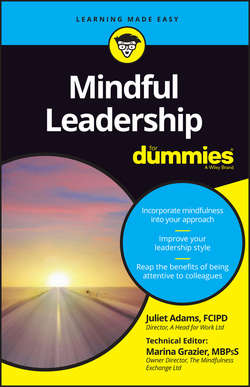Читать книгу Mindful Leadership For Dummies - Adams Juliet - Страница 8
На сайте Литреса книга снята с продажи.
Part 1
Breaking the Mould
Chapter 2
Discovering Why Mindfulness Matters to Leaders
Mindful Ways to Improve Your Leadership
ОглавлениеThe following sections discuss various ways you can improve your leadership mindfully.
Letting go of the stereotype
How do you become a more mindful leader, you ask? You may have already formed a mental image of how mindful people conduct themselves. Maybe thinking about this is conjuring up an image for you? Perhaps you think a mindful leader is a person with real presence, a person who is at ease with himself or herself, is open, wise, insightful, patient, kind and benevolent and has the strength of character to make ethical choices.
A mindful leader can of course be all these things, but this almost saintlike combination may feel unattainable or may foster a sense of inadequacy – neither of which is particularly helpful. The simple tips and techniques contained in this book will help you to develop metacognition (awareness of thoughts, emotions and bodily sensations), and maintaining an optimum state of mind, which are core components of mindfulness.
We encourage you to throw away any preconceived stereotypes of how a good leader should or shouldn’t be. Be authentic to yourself and your values. Strive to be the best you can in your own unique way. Good leaders come in many different guises – one size does not fit all.
Although academics may seek to capture and define the essence of mindful leadership, within this book the definition of a mindful leader is simply a leader who knows himself, takes personal responsibility for his actions, and makes a conscious effort to manage himself to be the best leader he can be.
By putting some effort into developing metacognition, treating yourself with kindness like a true friend, and trying to maintain an optimum state of mind, you’ll be better able to be the best you can in any given situation. Remember: as a human being, you will probably always be a ‘work in progress’. Cultivating mindfulness is a journey, not a destination. It can take a lifetime, but you can feel the benefits very quickly if you practice as you work through this book.
Recognising your stress levels
To reduce your stress levels, you need to first identify your current level of stress. There are numerous stress tests online that can help you to gauge your current level of stress. You can find a very simple stress indicator on the Resources page of my (Juliet’s) website – www.aheadforwork.com.
Mindful strategies for leading in a VUCA world
Working in a VUCA world may be inevitable, but suffering as a result optional. When faced with volatility, try to build in some slack to allow for unexpected volatile eruptions. Develop staff to be able to deal with a broad range of circumstances, and keep your workforce as flexible and nimble as possible.
When faced with uncertainty, collect, interpret and share information. Pool resources and support easy sharing and access to information. The more information you can gather, the less uncertainty for all concerned.
When working with complexity, you may need to reconsider your organisational structure. Do you have adequate specialists located in the right parts of the organisation to analyse, make sense of and inform action on the volume of incoming data? Allow time to stand back and evaluate which information is key and which isn’t worth the investment to make else of.
When working with ambiguity and the absence of any information, approach the challenge with an open mind and experiment. Test hypotheses, gather information, learn lessons, and eventually ambiguity will become certainty.
